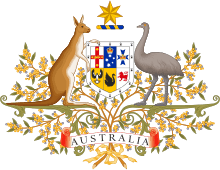Crimes Act 1914
 | |
| Crimes Act 1914 | |
| Enacted by | Parliament of Australia |
|---|---|
| Date enacted | 1914 |
| Date assented to | 1914 |
| Date commenced | 1914 |
| Keywords | |
| criminal code, federal crimes | |
The Crimes Act 1914 is a piece of Federal legislation in Australia. Pursuant to the Australian Constitution it prevails in any conflict with State laws dealing with the subject of crime.
The Commonwealth (or Federal) Government may not intrude upon the authority of the Australian States to legislate with respect to crime affecting their exclusive sphere of constitutional responsibility. For example, it may not legislate criminal penalties for the evasion of State taxes.
The Commonwealth may, however, legislate upon the subject of crime affecting its areas of conjoint (such as with respect to defence) or exclusive (such as with respect to external territories) responsibility.
Need for the Act
The Australian Federal Government started out in 1902 as a very small affair. As it grew in size and influence, the need became apparent for new Federal agencies and legislation to protect the dignity and interests of the Commonwealth. For example, the need for an Australian Federal Police became apparent when Prime Minister William Hughes was violently egged and assaulted by an anti-conscription crowd at Warwick, Queensland, in 1917 and the Queensland State Police neglected to step in to protect him.[1]
Thus, there was no federal crimes act for the first 13 years of Federation although certain offences had been defined by earlier legislation.
The Act now contains very few offences: most of these have been moved over to the Criminal Code (Commonwealth), which also outlines the principles of criminal liability under Commonwealth law. The Crimes Act is now relevant principally in procedural matters, and it is envisaged that even these provisions will be moved over to the Criminal Code, with the Act eventually repealed.
Scheme of the Act
- Part 1AA - powers of search, entry, arrest, seizure, interrogation, questioning protocol
- Part 1AB - controlled operations, ombudsman's oversight
- Part 1AC - use of assumed identities permissible
- Part 1AD - protection of children in proceedings for child sexual offences
- Part 1AE - video link evidence in proceedings for terrorism etc. offences
- Part 1B - sentencing, imprisonment and release of federal offenders
- Part 1C - powers of detention, obligations of investigators
- Part 1D - taking samples from suspects and witnesses, integration of DNA databases
- Part 2 - offences
- Part 3 - offences relating to the administration of justice
- Part 3A - child sex tourism
- Part 4 - piracy
- Part 6 - offences by and against public officers
- Part 7 - official secrets, unlawful soundings
- Part 7A - postal offences
- Part 7C - pardons, quashing of convictions, spent convictions
- Part 8 - miscellaneous
Selected offences and their maximum penalties
- Treachery: life imprisonment. This covers acts with intention to overthrow governments in Australia and 'proclaimed countries', and assistance to 'proclaimed enemies' and 'proclaimed countries'.
- Sabotage: 15 years imprisonment.
- Inciting mutiny: life imprisonment.
- Assisting escape of prisoners of war: life imprisonment.
- Unlawful drilling (in military exercises): 5 years for drill organisers, 2 years for others
- Damage to Commonwealth property: 10 years imprisonment
- Membership of unlawful associations (such associations must be formed with seditious intention): one year's imprisonment
- Incitement to destroy Commonwealth property or to overthrow a government: up to 2 years imprisonment
- Perjury: 5 years imprisonment
- Escaping from lawful custody: 17 years imprisonment
- Harboring an escapee: 5 years imprisonment
- Underaged sex overseas: 17 years imprisonment
- Piracy: imprisonment for life, vessels liable to be seized
- Unlawful disclosure by Commonwealth officer: 2 years
- Disclosure of official secrets with prejudicial intent: 7 years
- Mailing prescribed narcotics: 2 years
- Obstruction of the post: 2 years
Other miscellaneous offences
- Trespassing on Commonwealth land (punishable by fine)
- Unlawful discharge of firearm on (or over) Commonwealth land (punishable by six months imprisonment)
- Livestock trespass onto Commonwealth land (small fine)
- False certification under a Commonwealth law (up to two years imprisonment)
- False official statement to a Commonwealth or Territory government officer (up to two years imprisonment)